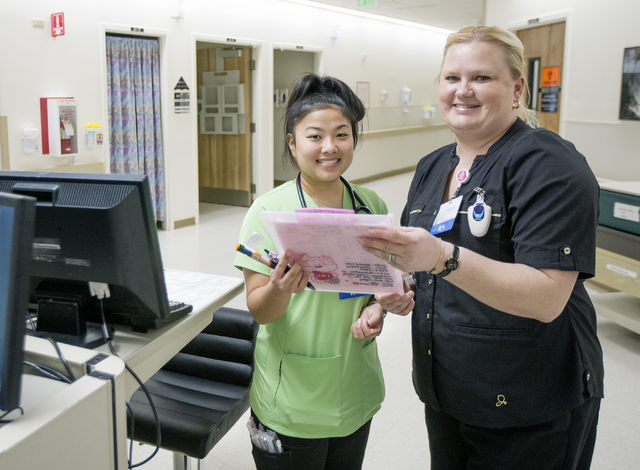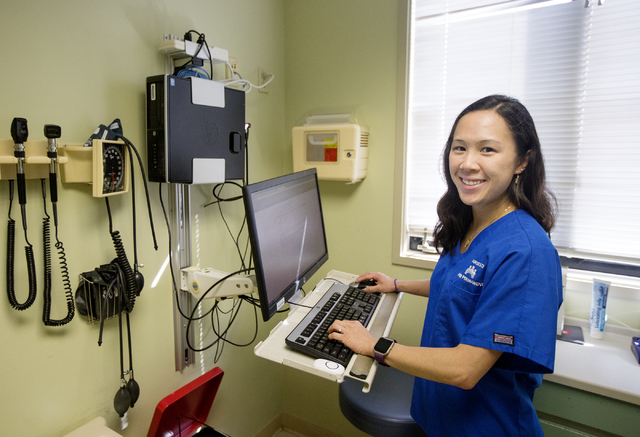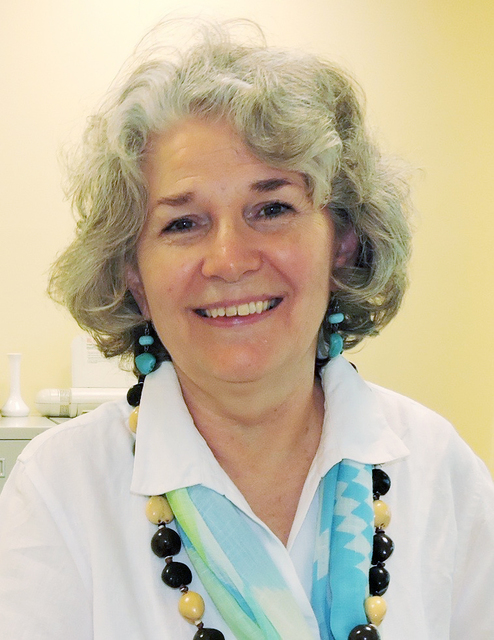Health care workers wanted: Job market strong for low- to high-level positions in East Hawaii
Workers from entry level to highly trained professionals are needed for high-paying East Hawaii health care jobs.
ADVERTISING
The jobs include direct patient care, but also diverse positions in fields such as cooking, security, clerical work, environmental services, administration and “coding” (conversion, for insurance claims, of medical diagnoses into code numbers).
The U.S. Bureau of Labor Statistics predicts the state of Hawaii will add 9,010 jobs in health care and social services in the decade leading up to 2024.
Hilo Medical Center, for example, had about 30 openings in various fields earlier this month, said spokeswoman Elena Cabatu.
“We’re our own city,” said HMC recruiter Marla Walters. “We have everything from laundry to feeding people to building and maintenance people. It’s not just medical.”
Jobs recently listed on the hospital’s website included a temporary level-II cook at $22.97 per hour and an entry-level temporary laundry worker at $18.87 per hour, a wage level HMC leaders say is a function of collective bargaining.
Some jobs are permanent; others are temporary or open to “travel” workers (individuals from other states or islands who fill slots for a few months at a time when a permanent employee can’t be found).
Kaiser Permanente had seven openings earlier this month.
“My recruiters tell me that Big Island positions are hard to fill,” said Laura Lott, director of communications for Kaiser in all of Hawaii. “Of the seven open positions, four are (licensed practical nurse) jobs.”
The Hawaii Dental Association notes that low unemployment rates and rising wages “do impact — and make it more difficult — to fill positions.” There’s not a dentist shortage in Hawaii, said HDA President Chris Lee.
But dentists rely on a team that includes office staff and hygienists.
“The market is good for employees seeking positions that require oral-health skills, experience and credentials,” Lee said.
Bay Clinic Human Resources Director Tim Marino said positions for family practice physicians are the most difficult ones for his organization to fill.
“Often, we must try to attract mainland candidates,” he said. “Although we offer competitive employment packages, Hawaii’s high cost of living and isolated location makes it a challenge to attract and retain physicians. This is a statewide problem, not just on the Big Island.”
Rural locations pose problems
At Ka‘u Hospital, the problem is compounded by the rural location.
To attract a staffer who is married, said administrator Merilyn Harris, it’s essential that the other person in the marriage can find a job, too. Unless that person’s a teacher, that can be difficult.
“We’ve been fortunate the last year in that we’ve recruited some really good nurses,” Harris said. Because of recent successes, the hospital is currently fully staffed — although a new position can open up at any time.
Hilo Medical Center also has had success with nurse staffing, said Holly Ka‘akimaka, regional human resources director. Training programs have been essential to that success, she said.
Nursing programs, including those at the University of Hawaii at Hilo, feed a supply line that makes it easier for East Hawaii health providers to connect with newly trained nurses.
“There’s a steady supply of nurses,” Ka‘akimaka said. “We are growing our own.”
Harris, though, said nurses at Ka‘u Hospital must be generalists, meaning they must be as capable of handling a trauma case as they are at handling more mundane daily routines on the hospital floor. Thus, such nurses must have diverse experience, and it’s not the right fit for recent college graduates.
“If you come from a hospital where you only worked in one area, you may not feel comfortable where you don’t know what’s going to walk in the door,” Harris said.
Bay Clinic’s Marino said difficulty recruiting staff can even delay the start of new medical service offerings.
At Hilo Medical Center, slots that are more difficult to fill include the specializations of occupational, speech and physical therapy.
“Those open positions are filled with travelers,” Ka‘akimaka said.
A speech therapist who lives on the mainland or in another country might want the opportunity to travel, or to try living and working in Hawaii before deciding to move here. Serving as a traveling therapist allows that to happen without the worker risking a long-term commitment.
“We do end up hiring a fair number of our travelers,” Walters said.
Bay Clinic’s Marino, though, said his organization has tried travelers, but that has changed — because of high costs and constant changes in providers.
“Patients prefer to see the same providers rather than a new provider each time they come for treatment,” he said. “Because of this, we have moved away from recruiting temporary providers and focus on hiring permanent providers.”
Kaiser’s Lott said it would be great to see more schools and classes “so the Big Island can provide locally trained talent for the skilled or licensed positions like LPNs and med techs.”
Bay Clinic gets referrals for its staffing pipeline from “trusted sources” and partners with places like the University of Hawaii School of Medicine and the National Health Service Corps to find qualified candidates.
“Many of our providers, including our medical director, were recruited through such programs,” Marino said.
Physical therapists, respiratory therapists, speech therapists, occupational therapists and physicians “are a challenge” to recruit, said Walters, of Hilo Medical Center. There’s always a greater need for physicians — than doctors available — to fill the slots, she said.
There aren’t enough training programs for students in fields like imaging (MRI or ultrasound, for example) or angiography to support staffing needs.
As a result, “the risk is when they have to go away for schooling and they make more money, or they get married,” Ka‘akimaka said.
Walters said there’s flexibility, in particular, for nurses. If you want to work only two days a week, to work nights only, to serve as a floor nurse rather than in the ER, “we’ve got jobs for that.”
If a nurse wants to specialize in intensive care, “then we’ll train them in the ICU,” said Hilo Medical Center’s Chief Nursing Officer Arthur Sampaga Jr.
“I’ve worked here 25-plus years, and I’ve worked in seven or eight different departments,” he said, including the medical floor, ICU, ER, short-stay, recovery, angiography, radiology and the operating room as a supervisor.
Although the Affordable Care Act that increased the number of U.S. residents with health insurance might change in the months ahead, Hawaii’s Prepaid Health Care Act requires employers to offer health insurance to employees who work 20 hours or more a week.
Thus, 76.5 percent of the state’s residents have health insurance, providing stability in the supply of people using health care, and stability in health-related employment.
Hilo Medical Center’s Walters and Bay Clinic’s Marino said job candidates can submit applications for such health-related employment through a health provider’s website.
“People that don’t have computers can walk in,” Walters said. “We take them right at the window. We take them any way we can get them.”
In Hawaii County, 7,700 people were employed in health care and social services as of November 2016, according to the the state Department of Business, Economic Development and Tourism.
For example, Hilo Medical Center has begun offering room service to hospital patients, treating them like hotels treat guests.
Patients will order “room service” meals from a menu that matches their diet plan and a room-service attendant will deliver the trays directly to patient rooms.
That room-service job is one that comes with benefits and good pay, Walters said.
How to get hired
What’s it take to get hired into health care-related jobs?
Hilo Medical Center’s Ka‘akimaka said she looks for high performance, patient-centeredness and team orientation.
Job candidate interviews are key, she said.
For example, someone who uses basketball as an example might have a particularly strong team orientation; talking about relationships might demonstrate patient-centered strength; and describing accomplishments illustrates high performance.
It’s those types of characteristics that shine through when a job candidate answers questions during a job interview.
Nursing, in particular, is a field that fits a wide variety of interests, Ka‘akimaka said. Nurses can become administrators, educators, caregivers for patients in high-stress environments like the ER and ICU, surgical nurses, recovery-room providers or floor leads.
Ultrasound tech Taylor Cambra returned home to Hilo after completing her degree at the Oregon Institute of Technology and actually prefers a higher level of job requirements. In big cities on the mainland, a tech like Cambra might perform certain types of ultrasounds over and over — and over.
But, in Hilo, Cambra appreciates the challenges of her job. She gets experience with a much wider range of cases and types of requested images. That’s a bonus she likes.
“We get a lot of variety in small hospitals,” she said.
But the smaller the hospital, the more it sometimes takes to recruit staff.
At Ka‘u Hospital, a drive of an hour or more, each way, to go to a show or to the grocery store has to be factored in. It is sometimes a struggle, Harris said, for new employees to fully comprehend that “you’re actually not going to spend all your time at the beach.”
Workers who are single and move to Pahala from the mainland can find it challenging, because the rural environment makes it difficult to find a partner.
“We have had people who have come to work for us who found it lonely,” Harris said.
But, for those who love rural life, the situation can be ideal. The 21-bed critical-access Ka‘u Hospital has about 62 employees and is currently fully staffed.
Integral to health workers’ efforts is an underlying patient focus that everyone from the security guard to the ultrasound tech to the surgical specialist must possess.
“This is a much-needed service in the community,” Ka‘akimaka said. “There’s nowhere else people can go. We have to be good.”
For those hunting for a job, health providers are eager to be considered, both by current residents and former residents.
“We want people to just take a look at us,” Cabatu said. “You never know where an opening will fit for someone’s loved one on the mainland to come back home. Everybody’s got a doctor in their family, or a physical therapist — we need them.”
Email Jeff Hansel at jhansel@hawaiitribune-herald.com.






